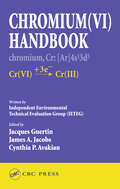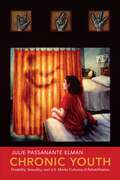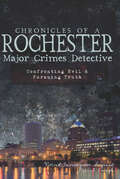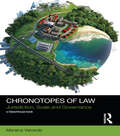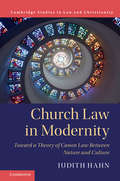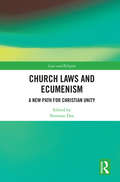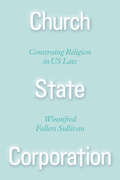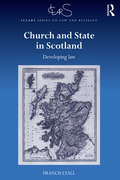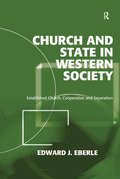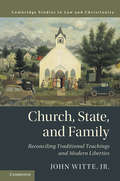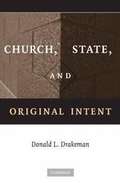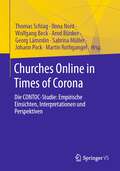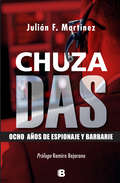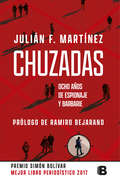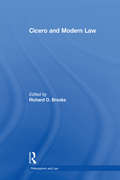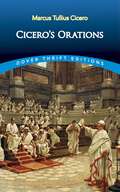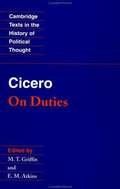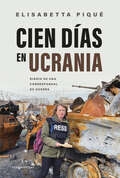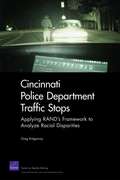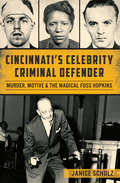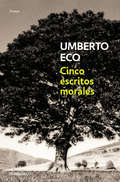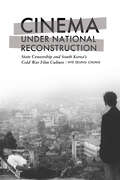- Table View
- List View
Chromium(VI) Handbook
by James A. Jacobs Jacques Guertin Cynthia P. AvakianPut together by a team of scientists, engineers, regulators, and lawyers, the Chromium(VI) Handbook consolidates the latest literature on this topic. The broad scope of this book fills the need for a comprehensive resource on chromium(VI), improving the knowledge of this contaminant at a time when the extent and degree of the problem is still being
Chronic Youth: Disability, Sexuality, and U.S. Media Cultures of Rehabilitation (NYU Series in Social and Cultural Analysis #4)
by Julie Passanante ElmanThe teenager has often appeared in culture as an anxious figure, the repository for American dreams and worst nightmares, at once on the brink of success and imminent failure. Spotlighting the “troubled teen” as a site of pop cultural, medical, and governmental intervention, Chronic Youth traces the teenager as a figure through which broad threats to the normative order have been negotiated and contained. Examining television, popular novels, science journalism, new media, and public policy, Julie Passanante Elman shows how the teenager became a cultural touchstone for shifting notions of able-bodiedness, heteronormativity, and neoliberalism in the late twentieth century. By the late 1970s, media industries as well as policymakers began developing new problem-driven ‘edutainment’ prominently featuring narratives of disability—from the immunocompromised The Boy in the Plastic Bubble to ABC’s After School Specials and teen sick-lit. Although this conjoining of disability and adolescence began as a storytelling convention, disability became much more than a metaphor as the process of medicalizing adolescence intensified by the 1990s, with parenting books containing neuro-scientific warnings about the incomplete and volatile “teen brain.” Undertaking a cultural history of youth that combines disability, queer, feminist, and comparative media studies, Elman offers a provocative new account of how American cultural producers, policymakers, and medical professionals have mobilized discourses of disability to cast adolescence as a treatable “condition.” By tracing the teen’s uneven passage from postwar rebel to 21st century patient, Chronic Youth shows how teenagers became a lynchpin for a culture of perpetual rehabilitation and neoliberal governmentality.
Chronicles of a Rochester Major Crimes Detect: Confronting Evil & Pursuing Truth (True Crime)
by Patrick CroughA longtime Rochester, New York, police detective tells the behind-the-scenes stories of four of his most memorable cases. Patrick Crough served more than twenty years as a Monroe County Major Crimes detective, where he investigated some of the region&’s most tragic crimes. They include horrifying acts, like that of a Valentine&’s Day killing rampage that left four people dead, as well as the case against Ed Laraby, the serial rapist who terrorized women in Rochester and Monroe County. But there are also stories of heroism and bravery: strangers coming to the aid of those in peril, parents who laid down their lives to save their children, and the team of people who put violent criminals behind bars. In these pages, Crough details four of his most memorable cases—in which he was forced to confront evil and chose to pursue truth.
Chronotopes of Law: Jurisdiction, Scale and Governance (Social Justice)
by Mariana ValverdeThis book develops a new framework for analyzing the spatio-temporal workings of law and other forms of governance. Chronotopes of Law argues that studies of law and governance can be reinvigorated by drawing on a bundle of quite heterogenous analytical tools that do not have a single provenance or a single political or normative aim but that work well in combination. Analyses of legal temporality carried out by anthropologists and studies of law and space undertaken by geographers and legal scholars have proliferated in recent years, but these research traditions have remained largely separate. By adapting notions such as intertextuality, dialogism, and the ‘chronotope’ from Mikhail Bakhtin, notions designed specifically to synthesize considerations of space and time in a framework that is open-ended, interactive and dynamic, Mariana Valverde develops an anti-metaphysical theory and method for legal studies. This approach will be useful both to theorists and to researchers seeking to illuminate the actual workings of law and other forms of governance. Indeed, a key aim of the book is to break down the institutional and disciplinary barriers that prevent theorists from learning from empirical studies and viceversa. Written by one of the foremost sociolegal scholars writing today, this theoretically innovative work constitutes a major contribution to contemporary studies in law and society.
Chuang Tzŭ: Taoist Philosopher and Chinese Mystic
by Herbert A. Giles Zhuang ZiChuang Tzŭ belongs to a period three or four centuries before Christ. A disciple of Lao Tzŭ, his writings, which as a consequence are mostly allegorical, are an attempt to refute the materialistic Confucian teaching that arose after Lao Tzŭ's death. Although Chuang Tzŭ failed in his aims, he left a work of marvellous literary beauty and great originality. This classic translation makes Chuang Tzŭ available to English readers with the aid of a running commentary incorporated in the body of the text.
Church Law in Modernity: Toward a Theory of Canon Law between Nature and Culture (Law and Christianity)
by Judith HahnNatural law has long been considered the traditional source of Roman Catholic canon law. However, new scholarship is critical of this approach as it portrays the Catholic Church as static, ahistorical, and insensitive to cultural change. In its attempt to stem the massive loss of effectiveness being experienced by canon law, the church has to reconsider its theory of legal foundation, especially its natural law theory. Church Law in Modernity analyses the criticism levelled at the church and puts forward solutions for reconciling church law with modernity by revealing the historical and cultural authenticity of all law, and revising the processes of law making. In a modern church, there is no way of thinking of the law without the participation of the faithful in legislation. Judith Hahn therefore proposes a reformed legislative process for the church in the hope of reconciling the natural law origins of church law with a new, modern theology.
Church Laws and Ecumenism: A New Path for Christian Unity (Law and Religion)
by Norman DoeWritten by experts from within their communities, this book compares the legal regimes of Christian churches as systems of religious law. The ecumenical movement, with its historical theological focus, has failed to date to address the role of church law in shaping relations between churches and fostering greater mutual understanding between them. In turn, theologians and jurists from the different traditions have not hitherto worked together on a fully ecumenical appreciation of the potential value of church laws to help, and sometimes to hinder, the achievement of greater Christian unity. This book seeks to correct this ecumenical church law deficit. It takes account of the recent formulation by an ecumenical panel of a Statement of Principles of Christian Law, which has been welcomed by Pope Francis and the Ecumenical Patriarch of Constantinople, leader of the Orthodox Church worldwide, as recognizing the importance of canon law for ecumenical dialogue. This book, therefore, not only provides the fruits of an understanding of church laws within ten Christian traditions, but also critically evaluates the Statement against the laws of these individual ecclesial communities. The book will be an essential resource for scholars of law and religion, theology, and sociology. It will also be of interest to those working in religious institutions and policy-makers.
Church State Corporation: Construing Religion in US Law
by Winnifred Fallers SullivanChurch and state: a simple phrase that reflects one of the most famous and fraught relationships in the history of the United States. But what exactly is “the church,” and how is it understood in US law today? In Church State Corporation, religion and law scholar Winnifred Fallers Sullivan uncovers the deeply ambiguous and often unacknowledged ways in which Christian theology remains alive and at work in the American legal imagination. Through readings of the opinions of the US Supreme Court and other legal texts, Sullivan shows how “the church” as a religious collective is granted special privilege in US law. In-depth analyses of Hosanna-Tabor v. EEOC and Burwell v. Hobby Lobby reveal that the law tends to honor the religious rights of the group—whether in the form of a church, as in Hosanna-Tabor, or in corporate form, as in Hobby Lobby—over the rights of the individual, offering corporate religious entities an autonomy denied to their respective members. In discussing the various communities that construct the “church-shaped space” in American law, Sullivan also delves into disputes over church property, the legal exploitation of the black church in the criminal justice system, and the recent case of Masterpiece Cakeshop v. Colorado Civil Rights Commission. Brimming with insight, Church State Corporation provocatively challenges our most basic beliefs about the ties between religion and law in ostensibly secular democracies.
Church and State in Scotland: Developing law (ICLARS Series on Law and Religion)
by Francis LyallThe interaction of faith and the community is a fundamental of modern society. The first country to adopt Presbyterianism in its national church, Scotland adopted a system of church government, which is now in world-wide use. This book examines the development and current state of Scots law. Drawing on previous material as well as discussing current topical issues, this book makes some comparisons between Scotland and other legal and religious jurisdictions. The study first considers the Church of Scotland, its ’Disruption’ and statutorily recognised reconstitution and then the position of other denominations before assessing the interaction of religion and law and the impact of Human Rights and various discrimination laws within this distinctive Presbyterian country. This unique book will be of interest to both students and lecturers in constitutional and civil law, as well as historians and ecclesiastics.
Church and State in Western Society: Established Church, Cooperation and Separation
by Edward J. EberleThe role of religion as a contentious and motivating force in society is examined here through the lens of the church-state dynamic in countries with three very different approaches to this crucial relationship. Focusing on the United Kingdom, where there is official recognition of one religion by the state, the United States, where law imposes a separatism between religion and the state and Germany, where there is cooperation between the church and state, this book compares these three models. It describes the components of each model, illustrates their operation and uses case law to examine what each model might learn from the other. Controversial and timely issues such as the refusal of medical treatment on religious grounds, the wearing of Islamic headscarves and ritual animal slaughter are discussed with new insight, providing a comprehensive review of varied approaches to law, government and religious freedom.
Church, State, and Family: Reconciling Traditional Teachings and Modern Liberties (Law and Christianity)
by John Witte, Jr.This book defends the fundamental place of the marital family in modern liberal societies. While applauding modern sexual freedoms, John Witte, Jr also defends the traditional Western teaching that the marital family is an essential cradle of conscience, chrysalis of care, and cornerstone of ordered liberty. He thus urges churches, states, and other social institutions to protect and promote the marital family. He encourages reticent churches to embrace the rights of women and children, as Christians have long taught, and encourages modern states to promote responsible sexual freedom and family relations, as liberals have long said. He counsels modern churches and states to share in family law governance, and to resist recent efforts to privatize, abolish, or radically expand the marital family sphere. Witte also invites fellow citizens to end their bitter battles over same-sex marriage and tend to the vast family field that urgently needs concerted attention and action.
Church, State, and Original Intent
by Donald L. DrakemanThis provocative book shows how the United States Supreme Court has used constitutional history in church-state cases. Donald L. Drakeman describes the ways in which the justices have portrayed the Framers' actions in a light favoring their own views about how church and state should be separated. He then marshals the historical evidence, leading to a surprising conclusion about the original meaning of the First Amendment's establishment clause: the framers originally intended the establishment clause only as a prohibition against a single national church. In showing how conventional interpretations have gone astray, he casts light on the close relationship between religion and government in America and brings to life a fascinating parade of church-state constitutional controversies from the Founding Era to the present.
Churches Online in Times of Corona: Die CONTOC-Studie: Empirische Einsichten, Interpretationen und Perspektiven
by Wolfgang Beck Arnd Bünker Thomas Schlag Ilona Nord Georg Lämmlin Sabrina Müller Johann Pock Martin RothgangelDie CONTOC-Studie hat in ökumenischer und internationaler Ausrichtung die digitale kirchliche Praxis unter den Bedingungen der Corona-Pandemie im Frühsommer 2020 erforscht. Dieser Band dokumentiert die Rahmenbedingungen und Umfrageergebnisse in den beteiligten Ländern. Daran schließen sich Perspektiven zu den zukünftigen Herausforderungen für die digitale Angebotspraxis und das Selbstverständnis der kirchlichen Akteur*innen an. Churches Online in Times of Corona. The CONTOC study: Empirical insights, interpretations and perspectives The CONTOC study has explored digital church practice under the conditions of the COVID-19 pandemic in the early summer of 2020 in an ecumenical and international way. This volume documents the framework conditions and survey results in the participating countries. This is followed by perspectives on the future challenges for the digital practice and the selfunderstanding of church actors.
ChuzaDAS
by Julián Fernando Martínez VallejoLa historia detrás de las chuzadas del DAS. Aunque el tema es parcialmente conocido, el reportero Julián F. Martínez en esta impresionante investigación, logra poner en contexto -además de adicionar datos aún desconocidos y una rigurosa documentación-, uno de los periodos más oscuros de la historia política del país. Más allá de lo que se llamaron las #chuzaDas#, este libro aborda otros hechos graves como espionaje, amenazas, persecución y asesinatos.
Chuzadas: Ocho años de espionaje y barbarie
by Julian F. MartínezLa historia detrás de las chuzadas del DAS. Aunque el tema es parcialmente conocido, el reportero Julián F. Martínez en esta impresionante investigación, logra poner en contexto -además de adicionar datos aún desconocidos y una rigurosa documentación-, uno de los periodos más oscuros de la historia política del país. Más allá de lo que se llamaron las chuzaDas, este libro aborda otros hechos graves como espionaje, amenazas, persecución y asesinatos. «ChuzaDAS es un documento que hace parte de la memoria histórica de uno de los peores episodios de los servicios de inteligencia de Colombia. Es un texto de consulta en donde cada una de las aseveraciones está comprobada con fechas, documentos de soporte y datos de contexto. Este libro es uno de los mejores trabajos de Julián F. Martínez, ya que gracias a su exhaustiva investigación demuestra que por órdenes del gobierno de turno se interceptaron diferentes periodistas, magistrados, jueces y miembros de la oposición política del momento. ChuzaDAS es y será, sin duda, un libro de referencia en elque se estudia cómo la manera de gobernar nunca debería deformarse o desvirtuarse para convertirse en persecución y espionaje». Yohir Akerman
Cicero and Modern Law (Philosophers And Law Ser.)
by Richard O. BrooksCicero and Modern Law contains the best modern writings on Cicero's major law related works, such as the Republic, On Law, On Oratory, along with a comprehensive bibliography of writings on Cicero's legal works. These works are organized to reveal the influence of Cicero's writings upon the history of legal thought, including St. Thomas, the Renaissance, Montesquieu and the U.S. Founding Fathers. Finally, the articles include discussions of Cicero's influence upon central themes in modern lega thought, including legal skepticism, republicanism, mixed government, private property, natural law, conservatism and rhetoric. The editor offers an extensive introduction, placing these articles in the context of an overall view of Cicero's contribution to modern legal thinking.
Cicero's Orations: In Catilinam I-iv, Pro Caelio, Pro Milone, Pro Archia (Dover Thrift Editions)
by Marcus Tullius Cicero Charles Duke YongeThe greatest orator of the late Roman Republic, Marcus Tullius Cicero (106–43 B.C.), influenced the course of European letters for centuries after his death. Through his writings, Renaissance and Enlightenment scholars encountered the riches of Classical rhetoric and philosophy. The elegance of his style, his skill and erudition, his worldly wisdom, and his profound humanity made Cicero a model for latter-day thinkers and keep his works ever relevant. This collection presents examples of rhetoric from throughout the ancient Roman's illustrious career. Selections include a series of famous speeches delivered during Cicero's term as consul which thwarted the Catiline conspiracy to overthrow the Republic — but led to his own prosecution and exile. The compilation concludes with the bold orations delivered in defiance of Marc Anthony, which sealed Cicero's doom.
Cicero: On Duties
by Marcus Tullius CiceroDe Officiis (On Duties) was Cicero's last philosophical work. In it he made use of Greek thought to formulate the political and ethical values of Roman Republican society as he saw them, revealing incidentally a great deal about actual practice. Writing at a time of political crisis after the assassination of Julius Caesar in 44BC, when it was not clear how much of the old Republican order would survive, Cicero here handed on the insights of an elder statesman, adept at political theory and practice, to his son, and through him, to the younger generation in general. De Officiis has often been treated merely as a key to the lost Greek works that Cicero used. This volume aims to render De Officiis, which was such an important influence on later masterpieces of Western political thought, more intelligible by explaining its relation to its own time and place. A wholly new translation is accompanied by a lucid introduction and all the standard features of Cambridge Texts in the History of Political Thought, including a chronology, select bibliography, and notes on the vocabulary and significant individuals mentioned in the text.
Cicero: On Moral Ends
by Julia AnnasThis 2001 translation makes one of the most important texts in ancient philosophy available to modern readers. Cicero is increasingly being appreciated as an intelligent and well-educated amateur philosopher, and in this work he presents the major ethical theories of his time in a way designed to get the reader philosophically engaged in the important debates. Raphael Woolf's translation does justice to Cicero's argumentative vigour as well as to the philosophical ideas involved, while Julia Annas's introduction and notes provide a clear and accessible explanation of the philosophical context of the work. This edition will appeal to all readers interested in this central text in ancient philosophy and the history of ethics.
Cicero’s De Finibus
by Julia Annas Gábor BeteghCicero is increasingly recognised as a highly intelligent contributor to the ongoing ethical debates between Epicureans, Stoics and other schools. In this work on the fundamentals of ethics his learning as a scholar, his skill as a lawyer and his own passion for the truth result in a work which dazzles us in its presentation of the debates and at the same time exhibits the detachment of the ancient sceptic. Many kinds of reader will find themselves engaged with Cicero as well as with the ethical theories he presents. This collection takes the reader further into the debates, opening up new avenues for exploring this fascinating work.
Cien días en Ucrania: Diario de una corresponsal de guerra
by Elisabetta PiquéGestado sobre el terreno en medio de sirenas y explosiones, el libro desnuda las historias de desasosiego de la gente común detrás de una guerra que marcará un antes y un después en los equilibrios geopolíticos del mundo. El colega italiano me pregunta si quiero sumarme a una lista de personas a evacuar que está preparando el consulado de Italia.Le agradezco, pero no. No tengo ninguna duda de que voy a quedarme en Kiev. acabo de llegar y quiero contar esta historia. Elisabetta Piqué fue la primera periodista en llegar al lugar exacto donde comenzaron a llover las bombas y los misiles que iniciaron la invasión rusa a Ucrania. Durante los cien días que totalizaron sus tres estadías en la zona de conflicto, además de informar como corresponsal de La Nación, se dedicó a documentar su experiencia cotidiana y a recoger las voces de víctimas y testigos anónimos. Gestado en terreno, en medio de sirenas y explosiones, este libro desnuda las historias de desasosiego de la gente común detrás de la guerra que está marcando un antes y un después en los equilibrios geopolíticos del mundo y, al mismo tiempo, permite asomar a la experiencia personal y sensible de una periodista en el peligroso frente de batalla. Testimonio de primera mano tan crudo y original como reflexivo y bien narrado, Cien días en Ucrania pone al descubierto los aspectos más tangibles y concretos de la vida en medio de una guerra distinta que se libra en el corazón de Europa y en las redes sociales, involucra a todo el planeta y no tiene fin a la vista.
Cincinnati Police Department Traffic Stops
by Greg RidgewayIn 2002, the Cincinnati Police Department (CPD) joined with other agencies and organizations to improve police-community relations in the city. This report focuses on the analysis of racial disparities in traffic stops in Cincinnati. The authors find no evidence of racial differences between the stops of black and those of similarly situated nonblack drivers, but some issues can exacerbate the perception of racial bias.
Cincinnati's Celebrity Criminal Defender: Murder, Motive & the Magical Foss Hopkins
by Janice SchulzMurder, deceit, and thrilling courtroom drama in this chronicle of Ohio&’s infamous criminal defense attorney, Foss Hopkins. With half a century in the courtroom, criminal defense attorney William &“Foss&” Hopkins represented more than 550 clients. Known to be charismatic and brilliant, Foss&’s dedication to defending the falsely accused often landed him in controversy. He specialized murder cases, and took on had more than a few colorful defendants . . . William Kuhlman and his gang left a trail of blood from Indiana to Kentucky after hacking up the body of Cincinnati fireman &“Cap&” Miller. Attractive and naïve Louise Sharpe pumped three bullets into her lover and left him dying on the floor of his Walnut Hills apartment. After Marie Abbott&’s farmhand lover killed her husband, Marie helped him stage the murder as an accident . . . These are just some of the people whose trials made Foss Hopkins Cincinnati&’s Celebrity Criminal Defender. In this captivating book you&’ll learn about the man himself, some of his most astounding victories, and the crushing defeats that ended in the electric chair.
Cinco escritos morales
by Umberto EcoPor qué la guerra ha pasado a ser hoy día inviable; las características y vigencia del fascismo; los cambios de la prensa ante la presencia de la televisión; los fundamentos y la posibilidad de una ética laica, y la tolerancia e intolerancia ante la migración que hará de Europa en los próximos años un continente multirracial.
Cinema under National Reconstruction: State Censorship and South Korea’s Cold War Film Culture
by Hye Seung ChungCinema under National Reconstruction calls for a revisionist understanding of state film censorship during successive Cold War military regimes in South Korea (1961–1988). Drawing upon primary documents from the Korean Film Archive’s digitized database and framing South Korean film censorship from a transnational perspective, Hye Seung Chung makes the case that, while political oppression/repression existed inside and outside the film industry during this period, film censorship was not simply a tool for authoritarian dictatorship. Through such case studies as Yu Hyun-mok’s The Stray Bullet (1961), Ha Kil-jong’s The March of the Fools (1975), and Yi Chang-ho’s Declaration of Fools (1983), the author defines censorship as a dialogical process of cultural negotiations wherein the state, the film industry, and the public fight out a battle over the definitions and functions of national cinema. In the context of Cold War Korea, one cannot fully understand or construct film history without reassessing censorship as a productive feedback system where both state regulators and filmmakers played active roles in shaping the new narrative or sentiment of the nation on the big screen.
